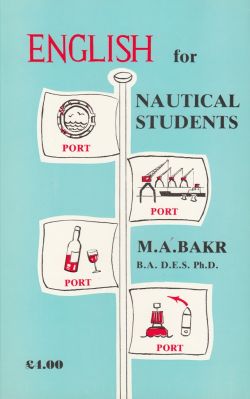
English for Nautical Students
By M. Bakr
- Price:
- £4.00
Item attributes
- ISBN:
- 978-0-85174-337-0
- Published date:
- First published 1979
Item details
Bibliographic Notes
The broad aim of this book is to develop in the nautical students an ability to communicate effectively in their general and specialist subjects in English. The principal purpose of the book is not merely to teach grammar, but to demonstrate to the students the use of the English grammar they have acquired in their early education. In designing the book, two basic assumptions were made. First, the students have had a good deal of instruction in English grammar, for at least six years, and they have, therefore, a considerable 'dormant' competence in English. The units of the book are arranged to activate this competence, and to extend it, by leading the students to relate their previously acquired knowledge of English to a meaningful realisation of the language system in texts of immediate relevance to their specialist studies. Second, the aim is not to teach subject matter, but to develop in the nautical students an understanding of how this subject matter should be expressed through English. However, the repeated exposition to the same term in more than one subject reinforces their mastery of this term.
It should be emphasised that the book is not designed to teach language or subject matter in isolation, but to combine both in meaningful communication. In relating content and expression in this way the subject matter takes new interest and the linguistic difficulties are reduced. The unnatural step-by-step presentation of grammatical patterns and vocabulary are avoided and an attempt is made to show the uses of the whole resources of the language in performing various acts of communication. At the same time care is taken not to overload the students with new material, and complex structures are avoided except where they are necessary to maintain a natural use of the language.
In the exercises an attempt is made to avoid mechanical drills. The exercises are designed to take rational thought and problem-solving into account. The aim of the exercises is to enable the students to see the relationship between expression and content, and thus to persuade them to appreciate the relevance of English learning in their own specialist field.

